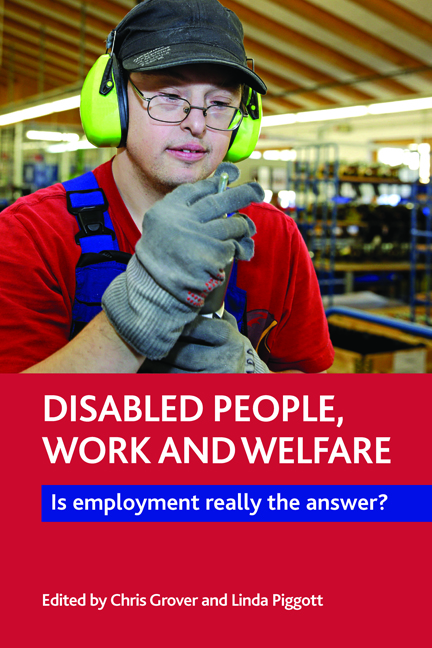Book contents
- Frontmatter
- Dedication
- Contents
- List of tables and figures
- List of abbreviations
- Notes on contributors
- Acknowledgements
- one Disabled people, work and welfare
- Part One Changing constructions of disability and welfare
- Part Two Social policy, work and disabled people
- Part Three Assistance and access to paid work
- Part Four Alternatives to, and validated lives beyond, paid work
- Part Five Conclusion
- Index
eight - Social dialogue, partnership and the Danish model of activation of disabled people: challenges and possibilities in the face of austerity
Published online by Cambridge University Press: 11 March 2022
- Frontmatter
- Dedication
- Contents
- List of tables and figures
- List of abbreviations
- Notes on contributors
- Acknowledgements
- one Disabled people, work and welfare
- Part One Changing constructions of disability and welfare
- Part Two Social policy, work and disabled people
- Part Three Assistance and access to paid work
- Part Four Alternatives to, and validated lives beyond, paid work
- Part Five Conclusion
- Index
Summary
Introduction
The number of people claiming sickness benefits has risen considerably across countries of the Organisation for Economic Co-operation and Development (OECD) and employment rates for those with a disability average around half of those without (OECD, 2009). In response to the increasing numbers of older workers and those with long-term health conditions receiving out-of-work benefits and the accompanying increase in public expenditure, most developed countries have reformed their welfare states to ‘activate’ these groups and to facilitate their entry into the labour market. These policy shifts have been characterised as ‘neoliberal workfare’, whereby entitlements to benefits are restricted and benefit claimants are subject to tighter work-focused conditions (Peck, 2001).
In the 2000s, the Danish ‘activation’ model was transformed towards stronger ‘work first’ principles, but has retained key traditional elements of social dialogue, with a particular emphasis on trade union representation and negotiated rights and duties for unemployed people. In particular, the Danish welfare reforms of 2013 promote co-production and an increasing ‘ownership’ by people on sickness benefits through user involvement in multi-agency services (Bredgaard, 2013). In Denmark, local government (and the elected representative political process) is responsible for running jobcentres and activation programmes. Social dialogue and partnerships are regulated through local employment committees (Lokal Beskaeftelses Rad – LBRs) in the municipalities, which include employers, trade unions and disability advisers as social partners (Damgaard and Torfing, 2010). The role of LBRs is to advise and monitor jobcentre performance, providing a link between benefit recipients, trade union officials and disability organisations. The trade unions have traditionally been key actors in the Danish labour market model through their representation on tripartite bodies and through management of unemployment insurance (UI) funds (Bredgaard and Larsen, 2008; Etherington, 2008).
The aim of this chapter is to explore the influence of social dialogue on activation for disabled people, looking at the emerging tensions arising from an increasing orientation towards workfare, which poses challenges to corporatism and the influence of the social partners on policy. Specifically, the chapter will:
• outline the reforms of the 2000s, involving a more work-first orientated strategy for disabled people;
• analyse the devolution and municipalisation of activation and the shift to multi-agency approaches embedded in the 2013 reforms;
• assess the impact of austerity and more intensified work-first-based interventions on the Danish welfare ‘consensus’.
- Type
- Chapter
- Information
- Disabled People, Work and WelfareIs Employment Really the Answer?, pp. 145 - 160Publisher: Bristol University PressPrint publication year: 2015



